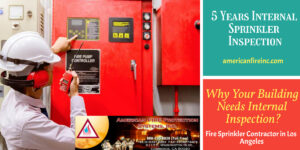Fire Sprinklers Systems, like all other components of infrastructure, are vulnerable to wear and tear regardless of their use. Even in very short periods and in newly installed fire sprinkler lines in a modern building, sludge may form surprisingly fast. Slime, rust, corrosion, or other foreign elements such as boulders are all examples of potential pipe clogs. As a result, they need constant maintenance and inspection to operate at peak efficiency. Apart from the necessity to perform inspections, it is obligatory to do so every five years under National Fire Protection Association (NFPA) standards. Internal fire sprinkler inspections for every five years verify that no obstructions in the plumbing might impair water flow.

NFPA-25 (2011 edition) 14.2.1 states:
“An inspection of piping and branch line conditions shall be conducted every five years by opening a flushing connection at the end of one main and by removing a sprinkler toward the end of one branch line for the purpose of investigating for the presence of foreign organic and inorganic material.”
There are three levels of internal pipe inspections, according to NFPA 25:
Level 1: The examination will begin with a preliminary evaluation. The first examination will comprise unplugging one of the main ends and removing a sprinkler tower from one end of a branch line.
Level 2: A more thorough obstruction examination will be conducted if sufficient foreign organic or inorganic material is identified clogging the pipe or sprinklers. Obstruction investigations will be conducted at a minimum of four locations across the fire sprinkler system:: System Valve, Riser, Cross Main, Branch Line.
Level 3: Obstruction Investigation: This procedure must be carried out if “foreign organic or inorganic material” is discovered during an internal pipe inspection. NFPA 25 specifies the procedures to be followed when conducting obstruction investigations.
Following the Fire sprinkler Inspection, the below actions might be necessary:
- Gauges must be changed or calibrated when used in conjunction with a calibrated gauge.
- Sprinkler heads must be examined and replaced as necessary.
- If the inspector cannot check the water storage tank, a qualified industrial diver or remote video should be used. Your inspector will look for pitting or corrosion in several areas of the tank, including the coating, pinholes, cracks, and overall wall thickness.
- All valves, particularly stress-reducing, stress relief, and fire hose valves, should be inspected for corrosion or blockage, sufficient pressurization levels, and operable clappers and seats.
- Internal piping will be investigated for obstruction if foreign materials are detected.
- The FDC (Fire Department Connection) should be examined to verify that the fire department can connect to it in an emergency and that it is clear of obstructive debris that may prevent water from passing.
Several advantages of inspections include the following:
- Confidence in the security of your facility
- Compliance with NFPA and local code and avoiding fines due to noncompliance
- Prevent damage to the structure and sprinkler system as a result of shortcomings.
- Save money on repair costs to the sprinkler system and damage to the building caused by deficiencies
- Maintain public safety
- Save money on insurance premiums
American Fire Inc professionals conduct an internal investigation, examine hangers, seismic bracing, pipes, fittings, sprinklers, test valves, replace gauges, and backflush the Fire Department Connection during a Five Year Inspection (FDC). American Fire Inc inspects fire sprinkler systems in-house, not via subcontractors. Thus, we maintain control over the quality of our fire sprinkler system inspection work and guarantee that you get the best possible customer service. Further, We are prepared to respond to your emergency demands, as well as special projects, tenant repairs, inspections, and installs. Contact us https://americanfireinc.com/contact-us.php
